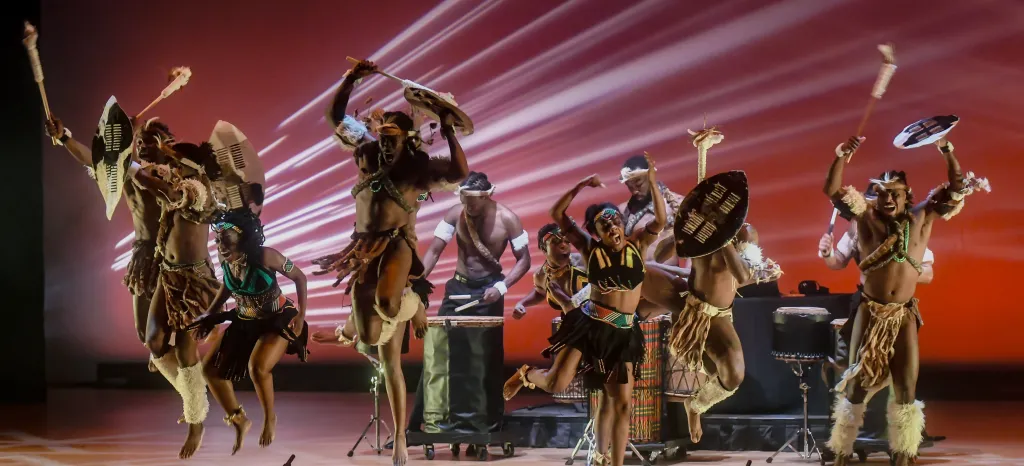Copyright Norfolk Virginian-Pilot

Just as great pressure creates diamonds out of coal — the world’s largest diamonds come, after all, from South Africa — man’s injustice to his fellow man can paradoxically create great art: an art of celebratory resilience and fierce protest. The Virginia Arts Festival’s two recent offerings, the Soweto Gospel Choir, back in Norfolk for a third time, and the American dance company Step Afrika (born of a partnership with Soweto Dance Theatre and here for a second time) illustrate the best in cultural exchange: Africans learning from and teaching Americans about their commonalities and differences and vice versa — much to the delight and enlightenment of peoples on both continents. Soweto Gospel Choir, which appeared in Newport News’ Ferguson Center on Oct. 12 and then at Norfolk’s historic Attucks Theatre on Oct. 14, drew an older but enthusiastic audience to hear its distinctive harmonies collected into a “Peace” concert. In its program the company cites the Rev. Martin Luther King Jr.’s words at the 1964 Berlin Jazz Festival: “God has wrought many things out of oppression. He has endowed his creatures with the capacity to create — and from this capacity has flowed the sweet songs of sorrow and joy that have allowed man to cope with his environment and many different situations.” King was likely citing W.E.B. Du Bois’ term “sorrow songs,” applied to the Black American spirituals that eventually transmuted into gospel songs. Soweto Gospel Choir, led by Shimmy Jiyane (choreographer, choir master, tenor and dancer), sang half of its program offerings in South African languages (including Zulu), many of which spoke of the agonies endured under apartheid, the racist system of oppression of South Africa’s Black majority and other people of color that lasted from 1948 to 1994. But the choir, formed in 2002, also sings songs in English, by artists as varied as Elvis Presley and our own Pharrell Williams (though not at the recent Norfolk show). Cynthia Erivo’s song “Stand Up,” moving beyond words, was sung at the Attucks concert, using the choir’s unique and intricate harmonies. Erivo wrote the piece for a contemporary biopic of Harriet Tubman in which she herself appeared as Tubman. Erivo’s last, Christlike, line, “I go to prepare a place for you,” sums up the power of great gospel music, especially as rendered in the Soweto Gospel Choir’s unique style and harmonies. Even the choir’s African costumes support the metaphor of difference within similitude. All feature the same evocative tailoring but are rendered using many dozens of unique colors and decorative patterns. All one could possibly wish for from this extraordinary group of singers is that someone spend a bit more care on their printed program titles and website — giving more accurate and extensive information about their songs. Audience members would love on-site access to translations, even if only on their cellphones or as stage projections. Step Afrika is the older of the two organizations. Founded in 1994 as a result of C. Brian Williams’ visit to South Africa, they are an African American group centered in D.C. with dancers from an assortment of historically Black colleges and universities and Black Greek organizations (also called, collectively, the “Divine Nine”). Lamar Lovelace is the company’s executive director, and Mfoniso Akpan is its artistic director. Several of the company’s 17-20 dancers hail from Howard University or Florida A&M; Bowie State and Virginia Union (in Richmond) are also represented. Though Step Afrika hails from and officially represents Washington, D.C., they have returned to their South African influencers, the Soweto Dance Theatre, for an extensive visit, as recently as 2024. Step Afrika performs at least one dance number in Zulu-inspired costuming. As a dance form, stepping — rooted in resistance to cultural suppression and exclusion — features “heavy, belligerent stomping” (called indlamu) and percussive claps, sometimes under raised legs (called ingoma), both terms mentioned in my 2022 review of Soweto Gospel Choir’s occasional dancing as part of their mainly singing concert. Step Afrika’s movements are similarly rapid, complex and athletic — involving mental memorization or muscle memory of many thousands of moves — likely more than any other dance form I have seen. When step shows are performed at Norfolk State University and at Black fraternity or sorority events, they are also impressively fast and difficult, but even they cannot compete with the speed and prowess of Step Afrika’s stepping professionals. The show, which included a special guest called “DJ JSparks,” is structured for younger fans with lots of audience participation and competitive “challenge” activities. Virtually all the Step Afrika dancers double, at least briefly, as drummers or other instrumentalists, all these transitions accomplished with unbelievable speed and competency. If either of these companies returns under the auspices of the Virginia Arts Festival, take advantage of your chance to see them and to consider the complex symbiotic flow of South African and African American influences moving back and forth. If you can see only one of the groups, I would select the Soweto Gospel Choir, based entirely on my age and tested inability to step dance. Listen to the English translation of the lyrics of “Nkonyane Kandaba” — “When you touch us … you are touching those who are immortal.” South Africans have overcome the oppression of apartheid but are fighting its aftermath still. They are our American mirror reflection in many senses, both for better and for worse. In their honor, I cite the title of South Africa’s once forbidden but now openly sung and beloved national anthem which symbiotically combines isiXhosa, isiZulu and other South African languages: “Nkosi Sikelel’ iAfrika (Lord, Bless Africa).” May the flow between our two countries remain productive, unhindered, and beautifully symbiotic. Page Laws is dean emerita of the Nusbaum Honors College at Norfolk State University. prlaws@aya.yale.edu ___ More arts



